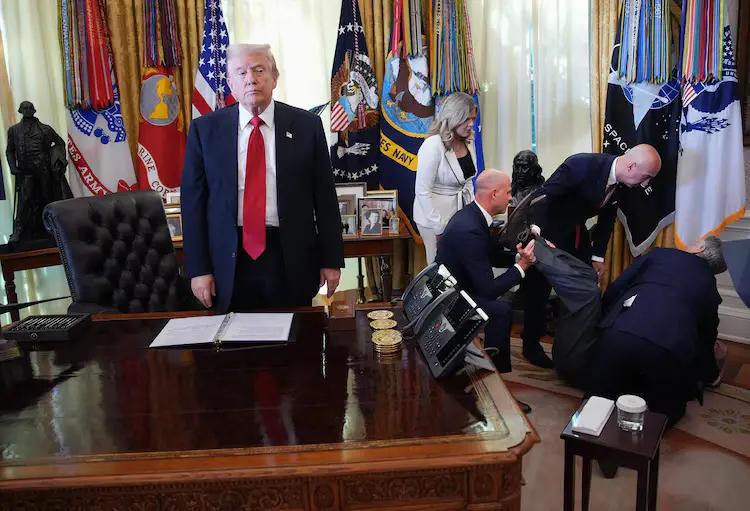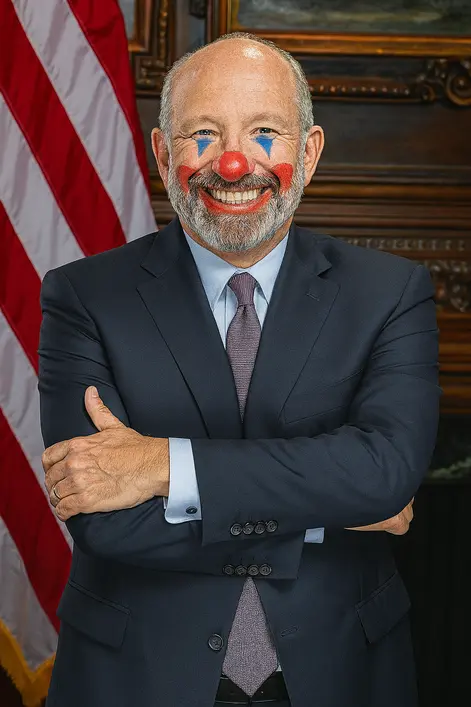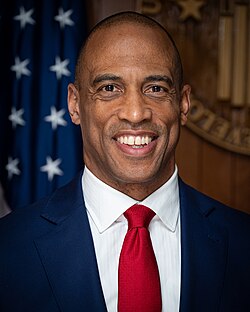Useless Sack of Shit Stands Motionless as Guest Collapsing at White House Obesity Event
In a scene straight out of political satire, a guest collapsed in the Oval Office during an event on obesity drugs — and whilst everyone rushed to his aid, Donny just stood there like the useless piece of shit that he is.

Donny remained motionless, watching blankly as staffers rushed to assist the fallen attendee. He's been described as looking “confused, maybe not even aware of what was happening,” as though the concept of reacting to another human’s distress was an unscripted moment he hadn’t rehearsed for.
While aides scrambled to clear the room and provide medical attention, Donny reportedly continued the event, pivoting back to his talking points about “America’s new era of health and wellness” — irony so thick it could clog an artery.
This latest Oval Office moment perfectly encapsulates the Trump administration’s approach to compassion: frozen, performative, and entirely out of touch. Insiders suggest The Don may have been too fixated on his own supposed weight-loss regimen — one he’s bragged about in recent weeks — to even notice what was unfolding a few feet away. Others think he simply didn’t care. After all, unless a crisis involves applause or flattery, it rarely registers.
White House staff later described the guest’s condition as stable, though officials were quick to redirect attention back to Trump’s “leadership on public health” — an assertion that landed about as well as the event itself.
The optics were disastrous: an event meant to promote health awareness derailed by an actual medical emergency — and a president too detached to respond. But perhaps we shouldn’t be surprised. This is the same man who once mused about injecting bleach, who dismissed a pandemic as a hoax, and who treats every tragedy like a PR inconvenience.
In any other administration, a guest collapsing at a health event would prompt reflection or at least a semblance of empathy. In The Don’s White House, it’s just another awkward tableau of narcissism and negligence.
So yes, the guest is recovering — but America is still stuck watching a leader who freezes at the sight of human need and mistakes callous indifference for strength. The Mad King didn’t miss a beat — because, frankly, he never had one.
70 Dead and Counting: The Don’s ‘Narco-Terror’ War Turns the Caribbean Into a Killing Field
Evaluation of Military Action under Trump Administration
Assault on Democracy Authoritarian RiskRationale
The airstrike, resulting in the deaths of individuals without clear evidence of their crimes, signals a potential normalization of extrajudicial killings. Coupled with the aggressive rhetoric from the administration and the lack of accountability and transparency, this action undermines democratic norms and represents a militarization of state response that risks eroding civil rights and the rule of law.
Under the watch of Defense Secretary Pete Hegseth, the Trump administration’s controversial campaign of airstrikes in the Caribbean has now claimed at least 70 lives, following yet another deadly assault on an alleged drug trafficking vessel this week.
The Pentagon released footage of the latest attack, which obliterated a small boat in international waters and killed three people. Hegseth proudly announced that the target was “operated by a Designated Terrorist Organization” — a phrase the administration has leaned on heavily, despite offering no public evidence linking any of the victims to actual terrorism or narcotics operations.
“To all narco-terrorists who threaten our homeland,” Hegseth declared, “if you want to stay alive, stop trafficking drugs. If you keep trafficking deadly drugs – we will kill you.”
It was a chilling statement — one that sounds more like a cartel threat than official U.S. policy. Since the so-called “narco-terror” campaign began in early September, 18 vessels — including 17 boats and a semi-submersible — have been destroyed by U.S. airstrikes. The administration calls them “lethal kinetic operations.” Legal scholars, however, are calling them something else: extrajudicial killings.
No U.S. troops have been harmed in the operations, largely because there has been no combat — only bombs dropped on poorly defined targets in international waters. Critics say the campaign is not only illegal under international law, but also dangerously destabilizing for the region. With U.S. warships and F-35s deployed off the coast of Venezuela and Colombia, Latin American leaders warn of an escalating military presence reminiscent of Cold War–era interventions.
Yet for The Don and his loyalists, the strikes serve a different purpose — not strategy, but spectacle. Each detonation is framed as another “victory” in a made-for-TV war, feeding the narrative of a strongman president who “kills the bad guys” while sidestepping Congress, oversight, and international norms.
But behind the bravado lies a grim tally — 70 dead, none named, none charged, none tried.
The administration’s refusal to provide evidence of drug activity, or even basic details about the victims, has drawn condemnation from human rights groups. “These are not drug interdictions,” said one Latin American security expert. “They are executions.”
The Don’s defenders call it decisive action. His critics call it state-sanctioned murder.
Either way, one thing is certain: America’s longest-running war on drugs has a new front — and a new body count.
Senate Bows to The Mad King: Republicans Hand Donny a Blank Check for War
Assessment of Senate Action on Venezuela Strikes
Assault on Democracy Authoritarian RiskRationale
The Senate's refusal to require congressional approval represents a critical failure in checks and balances, allowing the executive branch to act unilaterally in military matters. This bypassing of legislative oversight indicates a consolidation of power and a potential threat to democratic governance.
In a dark day for American democracy, the Senate voted 49–51 to block a Democratic resolution that would have required President Donald Trump to seek congressional approval before launching strikes in Venezuela.
The vote — almost entirely along party lines — effectively gives Donny unfettered power to wage war in Latin America, bypassing Congress and the Constitution alike. Only two Republicans, Rand Paul and Lisa Murkowski, broke ranks to support the resolution. The rest of the GOP stood lockstep behind their leader, waving through his latest power grab like courtiers applauding a monarch.
The move ensures that The Mad King’s shadow war in the Caribbean and beyond can continue unchecked. The Trump administration has already deployed an advanced U.S. aircraft carrier to the region, expanding its military footprint and preparing for possible land-based strikes in Venezuela under the guise of combating “narco-terrorists.”
Critics call it what it is: a dangerous slide into authoritarian rule.
“This is not about drugs — it’s about power,” said one Democratic senator following the vote. “And today, the Senate surrendered it.”
The Don has repeatedly made his intentions clear. “We’re going to kill people that are bringing drugs into our country,” he boasted earlier this month — an admission that the administration has abandoned any pretense of diplomacy, legality, or proportionality.
Human rights groups and constitutional scholars warn that the Senate’s failure to impose limits on Trump’s war powers effectively greenlights extrajudicial killings and unilateral military action — all without congressional debate or international authorization.
In the words of one foreign policy expert, “This is not oversight. It’s abdication.”
The Senate’s submission to the executive branch underscores how deeply Trump’s cult of personality has infected the Republican Party. Once the party of limited government, the GOP now eagerly hands its leader the tools of dictatorship — a man who sees global conflict as little more than a stage for his ego and re-election narrative.
Meanwhile, the death toll from Trump’s Caribbean strikes continues to climb, now exceeding 70, with no evidence that the victims were drug traffickers or terrorists.
The Constitution vests Congress with the power to declare war — but tonight’s vote makes clear that power has been quietly, almost casually, surrendered.
With this latest failure of courage, the Senate has effectively crowned Donald Trump commander, judge, and executioner — not just of foreign enemies, but of America’s own democratic traditions.
Supreme Court Backs Donny Yet Again: Ban on Gender-Accurate Passports
Analysis of Supreme Court Decision on Passport Sex Markers for Transgender and Non-Binary Individuals
Assault on Democracy Authoritarian RiskRationale
The ruling undermines the rights of transgender and non-binary individuals, effectively delegitimizing their identities and enhancing the power of the administration to enforce discriminatory policies, which evoke risks of authoritarianism.
In a ruling that cements the Trump administration’s assault on LGBTQ+ rights, the Supreme Court’s conservative majority has allowed The Don’s policy to stand — blocking transgender and non-binary individuals from selecting passport sex markers that reflect their gender identity.
The decision effectively forces millions of Americans to carry travel documents that deny who they are, a bureaucratic erasure that carries very real consequences for safety, dignity, and recognition.
Attorney General Pam Bondi, practically gleeful in victory, declared the ruling a win for what she called “the simple truth that there are only two sexes.” As if the infinite complexity of human identity could be reduced to a checkbox on a form.
Meanwhile, Justice Ketanji Brown Jackson’s dissent cut through the cruelty with devastating precision. Calling the ruling a “pointless but painful perversion,” she condemned the majority for prioritizing ideology over humanity.
“The Court’s decision imposes humiliation where compassion was required,” she wrote. “It turns a document meant for freedom of movement into a tool of state-sanctioned denial.”
This marks yet another chapter in The Don’s relentless campaign to legislate identity out of existence, all while dressing up bigotry as “biological realism.”
The passport policy — one of dozens of anti-trans measures advanced under Donny's second term — has been widely condemned by civil rights advocates and international human rights organizations. The UN Human Rights Office called it “a flagrant violation of dignity and equality principles under international law.”
But for The Don, this isn’t about policy or law. It’s about power — the power to dictate who belongs and who doesn’t.
By weaponizing the courts to impose his worldview, The Mad King has turned personal identity into a political battlefield, and in doing so, reminded the nation that his cruelty is not the byproduct of governance — it is the governance.
The Don’s America continues to shrink — a nation defined not by liberty or equality, but by the narrow confines of one man’s prejudice. And for millions of trans and non-binary Americans, that smallness now follows them across every border, stamped in ink by their own government.
For the record, here's all the "judgements" the Supreme Court have sided with Donny on:
SCOTUS Rulings
Watchdog Agency Head Firing Delayed - 21 February 2025
| Policy Area | Significance |
|---|---|
| Whistleblower Protection / Agency Independence | Supports stability in independent oversight amid executive pressure. |
Foreign Aid Payments Upheld - 5 March 2025
| Policy Area | Significance |
|---|---|
| Foreign Policy Funding | Affirms obligation to honor contracts and grants despite budgetary policy shifts. |
Teacher Training Grant Cuts Allowed - 4 April 2025
| Policy Area | Significance |
|---|---|
| Education Funding / DEI | Undercuts DEI-focused teacher support programs at state level. |
Reinstatement of Fired Federal Employees Blocked - 8 April 2025
| Policy Area | Significance |
|---|---|
| Employment Law / Federal Workforce | Strengthens executive discretion over staffing decisions. |
Reentry Ordered for Wrongfully Deported Salvadoran - 10 April 2025
| Policy Area | Significance |
|---|---|
| Immigration / Errors & Due Process | Emphasizes accountability and correction of government errors in deportation. |
Transgender Military Ban Allowed - 6 May 2025
| Policy Area | Significance |
|---|---|
| Civil Rights / Military Policy | Expands executive authority over military personnel policies, raises equal protection concerns. |
Limits on Alien Enemies Act Deportations Maintained - 16 May 2025
| Policy Area | Significance |
|---|---|
| Immigration / Constitutional Law | Reaffirms judicial oversight even in cases invoking wartime statutes. |
Termination of Venezuelan TPS Allowed - 19 May 2025
| Policy Area | Significance |
|---|---|
| Immigration / Humanitarian Status | Undermines protections for migrants from crisis-affected countries. |
Labor Board Officials Removal Allowed - 22 May 2025
| Policy Area | Significance |
|---|---|
| Administrative Law / Labor | Further erodes independence of labor-related entities. |
End of Immigration 'Parole' Upheld - 30 May 2025
| Policy Area | Significance |
|---|---|
| Immigration / Status Protections | Potentially exposes many to expedited removal, reducing avenues for relief. |
Access to SSA Data Permitted - 6 June 2025
| Policy Area | Significance |
|---|---|
| Privacy / Government Access | Raises privacy concerns regarding government surveillance power. |
DOGE FOIA Record Disclosure Block Extended - 6 June 2025
| Policy Area | Significance |
|---|---|
| Transparency / Advisory Bodies | Reinforces executive control over advisory entity transparency. |
Third-Country Deportations Allowed to Resume - 23 June 2025
| Policy Area | Significance |
|---|---|
| Immigration / Due Process | Limits procedural safeguards for migrants; emphasizes executive authority in deportation decisions. |
Birthright Citizenship Injunction Scope Narrowed - 27 June 2025
| Policy Area | Significance |
|---|---|
| Immigration / Citizenship | Clarifies limits on judicial power to issue nationwide halts on executive actions and underscores tension between executive authority and judicial oversight. |
Limits on South Sudan Deportations Lifted - 3 July 2025
| Policy Area | Significance |
|---|---|
| Immigration / Human Rights | Extends resumption of controversial deportations to politically unstable regions. |
Mass Federal Layoffs Cleared - 8 July 2025
| Policy Area | Significance |
|---|---|
| Labor / Administrative Action | Gives the administration broad leeway to reduce federal workforce despite legal challenges. |
Education Department Dismantling Permitted - 14 July 2025
| Policy Area | Significance |
|---|---|
| Education / Administrative Reform | Signals support for sweeping structural changes to major agencies. |
Removal of Consumer Product Safety Commissioners Allowed - 23 July 2025
| Policy Area | Significance |
|---|---|
| Administrative Law / Independent Agencies | Signals weakening of tenure protections for regulatory agency officials. |
NIH Grant Cuts Allowed - 21 August 2025
| Policy Area | Significance |
|---|---|
| Research Funding / Diversity Initiatives | Challenges DEI-related funding and scientific autonomy. |
Immigration Raids Proceed in Southern California - 8 September 2025
| Policy Area | Significance |
|---|---|
| Immigration Enforcement | Reaffirms executive discretion in immigration enforcement; raises Fourth Amendment concerns regarding profiling. |
FTC Commissioner Removal Stayed - 8 September 2025
| Policy Area | Significance |
|---|---|
| Administrative Law / Agency Independence | Raises questions about limits on executive power to remove independent agency officials. |
Foreign Aid Withholding Pause Granted - 8 September 2025
| Policy Area | Significance |
|---|---|
| Foreign Policy Funding / Congressional Appropriation | Heightens separation-of-powers dispute over control of spending. |
Supreme Court allows Trump officials to freeze billions in foreign aid - 26 September 2025
| Policy Area | Significance |
|---|---|
| Foreign Policy / Appropriations / Separation of Powers | This decision strengthens executive control over congressional appropriations in the foreign aid domain, at least as an interim remedy, and highlights how the Court is increasingly willing to engage in high-stakes emergency rulings affecting core powers between branches. |
Supreme Court upholds Trump administration rule limiting gender identity on passports - 6 November 2025
| Policy Area | Significance |
|---|---|
| Civil Rights / LGBTQ+ Rights / Administrative Law | This decision curtails federal recognition of gender identity in official documents and reinforces executive authority over identification policy. It marks a significant rollback of transgender rights, underscoring the Court’s willingness to defer to executive interpretations even when they restrict individual identity and equal protection. |



























